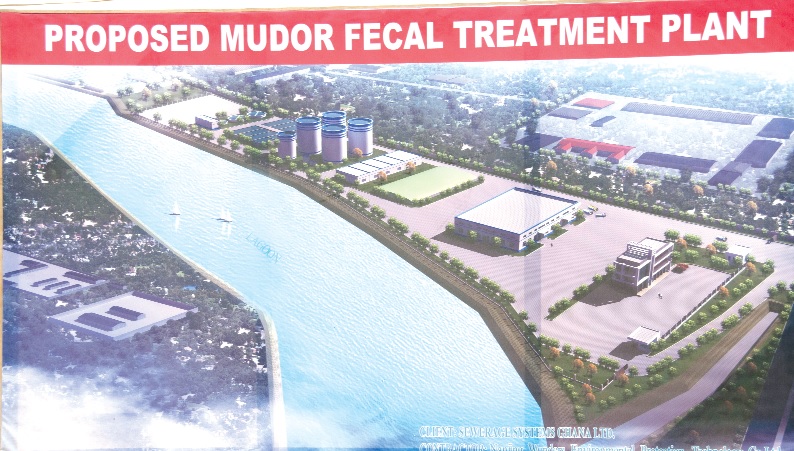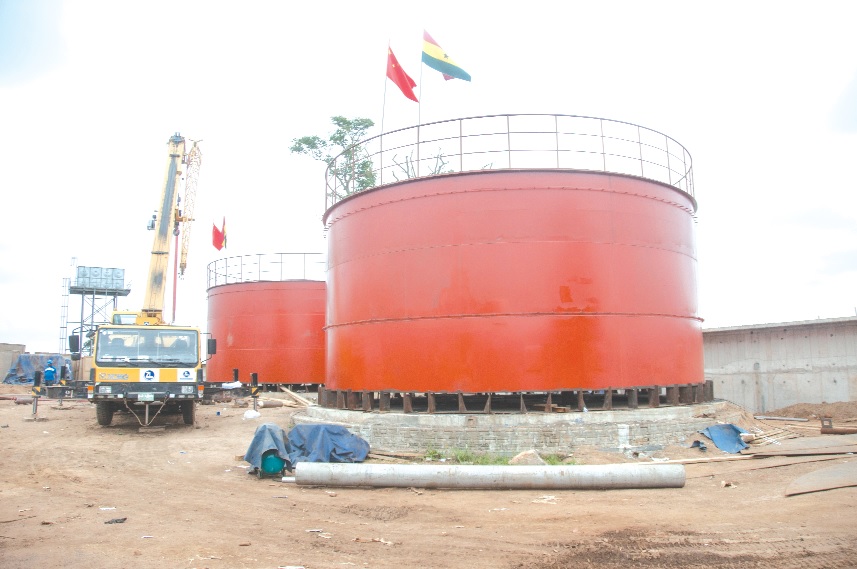
Transforming Lavender Hill into the Pearl of Accra: Jospong Group invests $41.2 million in wealth creation from faecal matter
The world over, there is population increase and urbanisation. The global urban population in 2014 accounted for 54 per cent of the world’s total population, up from 34 per cent in 1960, and continues to grow.
Advertisement
The urban population growth in absolute numbers is concentrated in the less developed regions of the world. According to the United Nations statistics, it is estimated that by 2017, even in less developed countries, a majority of people will be living in urban areas.
Country Statistics and Global Health Estimates prepared by the World Health Organisation (WHO) and the UN partners indicate that 40.1 per cent or 4.8 million of Ghana’s population live in slums. The report, also known as the WHO statistical profile of countries, further explains that 53 per cent of Ghana’s population lived in urban areas in 2013.
This trend has its own effect on social amenities. Governments, therefore, have to stretch themselves to provide the requisite necessities such as health and sanitation. This is where countries are continuously thinking outside the box in order to meet these challenges.
In countries such as France, Germany and Holland, governments and the private sector have come up with innovative ways to address the issue of sanitation management, which is unfortunately one consequence of urbanisation.
It is in the light of this and the need to secure Ghana’s sanitation management, especially in urban centres, that the initiative by Jospong Group of Companies, aka Zoomlion, needs particular mention.
Jospong’s contribution to waste management
Jospong’s contribution to waste management in particular and wealth creation from waste materials as well as providing employment for the population in general, is as quite revealing as it is commendable.
The relative environmental cleanliness and the general improvement in sanitation in the national capital speak volumes of the operations of Zoomlion.
Today, refuse pile-up in Accra has reduced considerably. The hitherto refuse heaps that were synonymous with Accra have given way to a clear and neat environment due to the effective and efficient manner with which Zoomlion has handled sanitation activities in Accra, Tema and other urban centres in the country.
Transforming Lavender Hill

It is against this background that the bold initiative by the same company to transform the Lavender Hill at Korle-Gonno into the pearl of the city of Accra should be hailed and supported by all Ghanaians.
Currently under construction is a $25 million Mudor Faecal Treatment Plant, designed to eliminate nuisance once and for all.
The existing nasty, disgusting disposal site, popularly known as Lavender Hill at Korle-Gonno beach, remains the major official faecal sludge dumping site where untreated sludge is discharged directly into the ocean.
Rather strange to relate, this spectre, apart from being an eyesore and dehumanising, is along the main Beach Road that leads to the central business district of the nation’s capital in this time and age.
This awful waste disposal site predates the country’s independence. Apart from the stench at Lavender Hill, the health hazard that it poses as a result of the primitive method of disposing of waste there is unimaginable. The retrogressive practice not only contaminates the sea, but also affects the fish stock and other living organisms. That is why the new project will be a big relief to Accra residents when completed.
The $25m project is not the only initiative by Jospong Group of Companies to help introduce some modernity or scientific approach to the management of liquid waste in Accra. Another facility under construction at Adjen Kotoku, near Nsawam, at a cost of $9 million is at an advanced stage of completion; together with the $25m Accra project, if completed, will have a combined capacity of processing a total of 3,000 cubic metres of liquid waste daily. This translates into treating 750 (250 trucks =1,000 cubic metres) septic trucks a day, which is more than we currently generate. A third liquid waste management project, the rehabilitation of the Accra Treatment Plant (Mudor) at a cost of $7.2 million, is in progress.
Faecal sludge treatment technology
Jospong’s latest investments would undoubtedly ensure a more lasting and indeed enduring sustainable faecal sludge treatment technology in Accra and Adjen Kotoku.
What is amazing about this technology is that the end product, being water, which is unwholesome for consumption becomes useful for fish farming, horticulture, car wash, hydrants, gardening etc. In addition, there is a by-product which can also be transformed into compost manure for agricultural purposes and above all, biogas is also generated.
“It was my passion for the introduction of appropriate waste management technology in general that made me invest heavily in these infrastructures to help overhaul Ghana’s primitive waste management practices,” the Chairman of Jospong Group, Dr Joseph Siaw Agyepong, said.
It is no wonder, therefore, that Dr Agyepong is investing a whopping $41.2 million in the three projects. What makes the ongoing projects even timelier and crucial is the latest World Bank Report, which has predicted that Ghana’s urban population is set to hit 22 million by 2030.
The report asserts that 65 per cent of the country’s population will be migrating to the urban centres in the next 15 years, compounding the pressure on existing infrastructure including waste management.
More disturbing and irritating in the report is that rural-urban migration dynamics, if not checked, would have dire consequences on human existence. The report indicates that Ghana’s urban population has more than tripled over the last three decades, rising from four million to nearly 14 million people, outpacing rural population growth.

Some project details
The $7.2 million rehabilitation project on the waste water treatment originally constructed by Taylor Woodrow in 2000 on the eastern side of the Korle Lagoon at James Town, when completed, will increase the capacity from 16,200m to 18,000m a day.
The new design would help introduce more scientific technology that would serve the network of liquid waste from Korle Bu, State House, Ministries, High Street, Osu, Labone and the Central Business Area.
It involves the construction of an integrated treatment plant and four pumping stations as well as the rehabilitation of sewer lines under ASIP2 Project of the Accra Metropolitan Assembly.
On completion, the two other facilities would function along these lines. Pipes of septic trucks carrying liquid waste would be hooked or connected to a docking device to enable the trucks to discharge. As the liquid waste (toilet) contains bulky materials, the facility has a liquid solid separator machine installed which separates the solid materials from the water.
The system again has a device that ensures that the wet bulky solid material goes through another process where water is still derived after which the waste water then moves to the water treatment plant where chemicals (flocculants) are applied to further remove the small solid particles in the water.
After this and a few processes it goes into installed Upflow Anaerobic Sludge Blanket (UASB) tanks, designed to remove the remaining particles from the water through filtration.
The solid materials generated through the system is used for compost manure while the biogas generated will be harnessed and used as a source of alternative energy for the plants with the excess being commercialised.
The solid materials emanating from the processes in the two plants would be conveyed to Jospong Group’s Accra Compost and Recycling Plant (ACARP) where the Group has for some time now been treating solid waste at Adjen Kotoku, which houses the $9 million plant, for the production of compost manure.
Benefits
Experts agree the project will yield enormous benefits to the country in the form of:
• Alternative source of cheap energy supply (biogas)
• Creating employment opportunities for the youth, both skilled and unskilled
• Eliminating prevailing health hazards and implications on the national economy.
• An end of the pollution of water bodies
• Environmentally, degradation associated with the present solid waste disposal will be a thing of the past.
• Leading to increased agricultural and horticultural activities among others.
Tour of installation sites
Engineers Jacob Nkunu and Mrs Florence Cobbold, who conducted this writer round the installation sites at Adjen Kotoku and Accra respectively, where Chinese experts from Nanjing Wonder Company were busily working with their Ghanaian counterparts, were upbeat about the importance and the benefits to be derived from such investments. The two projects would together provide employment for over 270 people (direct jobs) aside from those who will have the opportunity to sell food and other things to workers.
The Adjen Kotoku project is expected to be completed by the end of January 2016 while the Lavendar Hill one, being executed by Sewerage Systems Ghana Ltd, a subsidiary of the Jospong Conglomerate, which has workforce of over 70,000 countrywide, is envisaged to be completed by August 2016. Work on the $7.2 million rehabilitation project also being executed by Sewerage Systems, is scheduled for completion by the end of the year.
Technological innovation in sanitation management is urgently required, especially in the developing world as sanitation is a basic need and a precondition for economic and social growth. That is why these projects by Jospong are worth national support.



